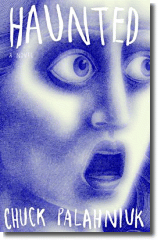Here are the three novels from the list that I've read:
Chuck Palahniuk, Haunted (2005)Click here to read about the other three titles.
That philosophy about why novelists write novels about novelists writing novels takes on yet another layer of depth in Haunted, the latest from Fight Club author Chuck Palahniuk. The action starts in a writers' retreat, where 17 wannabes retire away from the world's eyes to create their masterpieces. But it turns out that the only stories they have in them are their own sordid histories of botched masturbation, cannibalism, corpse-desecration, and many more such horrors. As the book progresses, these stories emerge, and they start a new, more visceral writing project: rewriting history, with them as the victims of the people running the retreat. Looking forward to their imagined fame, they torture themselves and each other so they'll have plenty of shocking material for their imagined bestseller tell-alls. Rarely have the self-destructive aspects of writing—the isolation, the self-examination, the mining of personality for useful tidbits to offer the world, the exposure that follows—been made so literal, or so relentlessly graphic.
Michael Connelly, The Poet (1996)When Denver crime reporter Jack McEvoy sets out to investigate the suicide of his cop brother, he discovers that the death might be the handiwork of a fiendishly clever serial killer. Soon, the journalist comes up against a different kind of deadline! Or something like that. Michael Connelly's bestselling thriller set a new standard for the murderous-genius genre—one so swiftly imitated that it's doubtful anyone could ever adapt The Poet for the big screen without being accused of ripping off the stories that came later. But what gives the book its flavor is the way Connelly describes what it takes to write for a daily paper and solve mysteries without a badge. It's a process Connelly knows well from his own days working the murder beat—though presumably he never had to file his stories under any literal gun.
Vladimir Nabokov, Pale Fire (1962)
Nabokov's lovely classic Pale Fire isn't just a book about writers writing, it's also a book about rewriters rewriting. In an intricately nested story, Nabokov presents an epic poemabout death and the possibility of the afterlife, ostensibly written by an American poet, John Shade. Then he presents the story of how the poem came to be written, and how it came into the hands of Shade's neighbor Charles Kinbote. Finally, Kinbote presents his own editorial explanation of the poem, recasting it all as a metaphorical image of Kinbote and his homeland. Many interpretations of the book have been offered, but the entire thing works beautifully as a smart, skillful satire on the way well-meaning scholars dissect and deconstruct literature, sometimes warping it unrecognizably. On some level, it's a tremendously sad book, raising the question of why writers bother at all, since their intentions may not survive them, and their works become vulnerable the moment they leave the brain and hit the page. But in spite of all the misinterpretation and willful predation, Pale Fire is still a wryly hilarious book, particularly as a portrait of writerly delusion and self-aggrandization.
(Hat tip to escapegrace.)
--Marshal Zeringue






